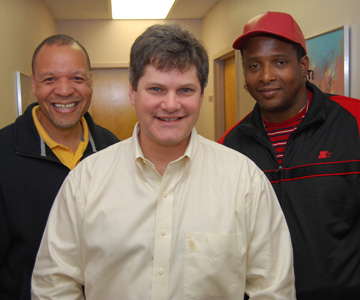Editorial
Front Page - Friday, October 23, 2009
Prisoner visitation effort first step in opening doors
David Laprad

Tim Dempsey, CEO of Chattanooga Endeavors, says a man finds out who his friends are when he goes to prison. Everyone else drops likes flies.
The problem is that the inmate’s community misses a chance to bring about positive change by spending time with him while he’s incarcerated and then helping to get him back on his feet once he’s released. Chattanooga Endeavors, a nonprofit organization that aims to improve public safety by restoring former offenders to productive roles in society, wants to turn this around.
“Our criminal justice system is like a four-legged stool,” Dempsey says. “We’re good at arresting people, we’re good at prosecuting them and we’re good at confining them. What we don’t do well is rehabilitation. And that’s where you can break the cycle of crime.
“It’s not something we can outsource to the government, though. When someone comes home, it’s our job to open doors and provide legitimate opportunities to people who have been incarcerated. Otherwise, we’re asking them to re-offend.”
Step one for Chattanooga Endeavors is a new program called Stephen’s Table, which connects local churches with prisoners at the beginning of their incarceration. To make sure someone stays in touch with the inmate throughout his incarceration, each prisoner is assigned to a Stephen’s Table committee at a particular congregation. The relationships that develop during visits help the prisoner stay connected to his community and can be an important aspect of an inmate’s assimilation back into society when he’s released.
“We want them to know we haven’t forgotten them. We want to help them make decisions that will impact their life in a positive way. And we want to provide them with a faith community to come home to when they’re discharged,” says Dempsey. “We’re asking that churches develop relationships, not extend themselves in material ways.”
According to research conducted in Florida, Dempsey says, prison visits lower the likelihood that former offenders will commit another crime. Allegedly, one face-to-face visit in the last month of a prisoner’s incarceration reduced recidivism 3.5 percent, while one visit per month during the last 12 months decreased it by 30 percent.
The keys, Dempsey says, are the visits and the relationships that develop as a result. “When you ask an inmate how many times he’s been charged with a crime, he can’t remember, but when you ask him how many times someone has visited him in prison, he can tell you the exact number. Unfortunately, many inmates don’t have anyone
coming to see them. They feel abandoned.”
James Sorrell, a former prisoner, nods in agreement. “Penitentiaries use visitations as a disciplinary constraint. They won’t let you get a visit if you don’t do what they say. That’s how important they are to those guys. They get to talking about visits and gang members straighten up.”
Since no one from Sorrell’s church visited him during the nearly five years of his incarceration, when he was released, he had to re-establish all of his old relationships. “I told my pastor there’s a verse in the Bible that says when a good shepherd takes care of 100 sheep, and one goes astray, he leaves the 99 to go find the one,” he says. “And we have a lot of lost sheep out there.
“It makes you bitter when you’ve been a member of society, and you got kicked out because of something you did, and when you return, there’s no one there for you.”
The staff at Chattanooga Endeavors understands it takes more than meaningful relationships to reintegrate a former offender into society; it takes gainful employment and, in some cases, the help of a variety of social services. To that end, the organization offers a 60-hour work readiness course that reinforces positive behaviors and teaches the interpersonal and problem solving skills needed on any job.
Participants earn a Work Readiness Certificate, create a job search package and gain access to a network of employers. Classes are taught by a combination of volunteers from various companies and Chattanooga Endeavors personnel.
Chattanooga Endeavors volunteers are also able to connect former offenders with a variety of social agencies, depending on their needs.
Fortunately, Sorrell made contact with Chattanooga Endeavors after his release from prison. Today, he’s out of prison, back with his family and has a job. Just as important, the issue that led to his incarceration is behind him.
“Chattanooga Endeavors made me feel like I’m a part of something important and that I have something I can give back,” says Sorrell. “I can tell other guys I’ve stayed out of prison for five months and I’m living productive. I can tell them I have someone I can talk with if I don’t feel good, someone who will hold me accountable for my actions.
“We have a lot of guys in the penitentiary who are going to be returning to society. We can help them.”
Sorrell is right about the positive role he can play in society. And if the numbers Dempsey quotes regarding the amount of people going through the criminal justice system in the U.S. are correct, former offenders who turn their lives around through programs like Chattanooga Endeavors will have plenty to do.
“Three percent of the population in the U.S. has served time in prison,” Dempsey says. “That’s an extraordinary number of people who have experienced incarceration and the difficulties of re-entry.
“In Tennessee, 22,000 people are incarcerated, with about 14,000 going home each year. In Hamilton County, we send off about 500 and get back about 500.”
And the numbers are growing, says Dempsey, giving weight to the work of organizations like Chattanooga Endeavors.
“Through Stephen’s Table, churches can be faithful to the Biblical imperative to visit prisoners,” Dempsey says. “And the training we provide enables churches to respond to the pressing needs coming their way.”
For more information about Chattanooga Endeavors and Stephen’s Table, visit www.chattanoogaendeavors.com.
|
|